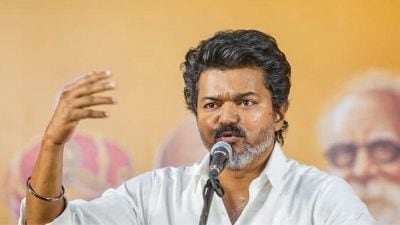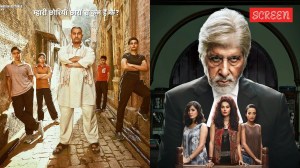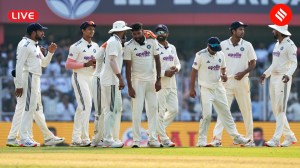Rift with Pawar didn’t feed riots, says Naik
Former Maharashtra Chief Minister Sudhakarrao Naik speaking to lawyers after the first day of his deposition before the Srikrishna commissi...

Former Maharashtra Chief Minister Sudhakarrao Naik speaking to lawyers after the first day of his deposition before the Srikrishna commission on Friday.
MUMBAI, May 2: Former Chief Minister Sudhakarrao Naik has dismissed the allegation that the 1992-93 riots in the city went on as a result of dissent within the Congress, specifically the power struggle between the then Defence Minister, Sharad Pawar, and himself.
It is widely believed that Pawar’s group did everything to prove the Naik government inefficient. Deposing before the Srikrishna Commission today, Naik did not comment on this, only saying: “I don’t agree that the riots went uncontrolled due to the power-play between me and Sharad Pawar. It is not true that I complained about Pawar to the then Prime Minister, Narasimha Rao, when he visited the city during the riots.”
Naik didn’t try to conceal his closeness to Sena chief Bal Thackeray and Chief Minister Manohar Joshi. He said he had a long association and friendship with both men.
When senior counsel Solkar, representing the Milli Council, asked him whether the reluctance to arrest Thackeray and ban the Sena for their alleged role in riots was a political decision, he didn’t deny it. “To some extent it was. And anyway, to arrest someone there have to be legal provisions,” he said.
Naik admitted that his government didn’t do anything when the Hindu brigade, comprising the BJP, the Shiv Sena, the Bajrang Dal and the VHP, organised the Ram paduka pujan, which allegedly built up communal tension “But there was no occasion where we could pin them down,” he said, adding that he knew nothing about the recruitment of kar sevaks by Hindu organisations in the city.
Naik admitted that he had replied in the positive when the Urdu Blitz editor, Haroon Rashid, had asked him during an interview whether the police colluded with Shiv Sainiks during the riots.
The former Chief Minister said he never thought the disputed structure in Ayodhya would be demolished as the then Uttar Pradesh Chief Minister, Kalyan Singh, had promised to protect it at any cost. “After hearing about the demolition in Nagpur while attending the legislative Assembly session, I expected that the kar sevaks would cause some trouble in the city.”
Naik spelt out three possible reasons for the riots. “According to me, the first was the demolition of the masjid, the second my stern action against underworld groups when I was the Chief Minister, and the third the demolition of unauthorised buildings by the municipal authorities around the same time.”
The former Chief Minister said he felt that the maha aartis, though religious affairs, were in retaliation to the practice of namaaz on streets by Muslims. He admitted that some Congressmen also took part in the aartis.
Naik said, “In December 1992, the police had to carry out large-scale firing against rioting Muslims mobs, following which they started the 1993 riots as a way of taking revenge. The two events of killing some Hindu men and setting them on fire at Radhabhai Chawl were the ones which intensified the riots in January 1993.”
He also said the Army was to blame for ineffectiveness in handling the riots. “The presence of the Army didn’t have any effect on the rioting mobs as it just carried out flag marches,” Naik said.
To a question by senior counsel Yusuf Muchala, Naik said the decision to transfer S K Bapat as the police commissioner was a mistake. “It is true the transfer decision by me was arbitrary and capricious,” he admitted.
The former Chief Minister also criticised the media for showing the police in a negative light during the riots. “The BBC covered the demolition and showed the police standing as mute spectators. It could have generated a general bias against the police,” Naik felt.






- 01
- 02
- 03
- 04
- 05

























